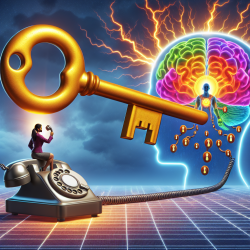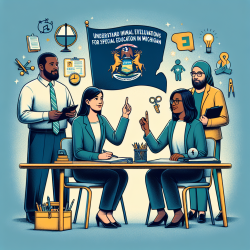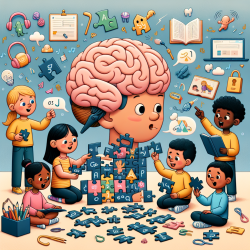Introduction to Goal Management Training (GMT)
In the realm of speech-language pathology and cognitive rehabilitation, data-driven decisions are paramount. The recent study titled "Telephone-based goal management training for adults with mild traumatic brain injury: study protocol for a randomized controlled trial" offers valuable insights into innovative rehabilitation methods. This blog explores how practitioners can leverage these findings to enhance their skills and improve outcomes for children and adults with cognitive impairments.
The Silent Epidemic of Mild Traumatic Brain Injury (TBI)
Mild traumatic brain injury (TBI) is often an under-recognized condition that affects over 1 million individuals annually in the United States, costing approximately $17 billion each year. Symptoms such as poor concentration, confusion, and irritability can lead to long-term disabilities, impacting vocational and social functioning. Executive functioning deficits are particularly disabling, affecting planning, decision-making, and goal-directed behavior.
Goal Management Training: A Structured Approach
Goal Management Training (GMT) is a structured cognitive rehabilitation program designed to improve executive functioning. Traditionally used for moderate to severe TBI, GMT has been adapted for telephone delivery to increase accessibility. This approach is particularly beneficial for patients facing barriers such as mobility issues and financial constraints.
Study Insights: Telephone-Based GMT
The study conducted at a Level I trauma center involved a three-group randomized controlled trial. Ninety trauma survivors with mild TBI were randomized to receive telephone-based GMT, telephone-based education, or usual care. The GMT program consisted of seven sessions, with the first session in-person and the remaining sessions conducted via telephone.
- Session Structure: Each session focused on increasing awareness and self-efficacy through mindfulness and goal-setting techniques.
- Outcome Measures: The study assessed executive functioning, functional status, and psychological health using validated cognitive tests and questionnaires.
Implications for Practitioners
For practitioners in speech-language pathology and cognitive rehabilitation, the study highlights the potential of telephone-based GMT as a feasible and effective alternative to traditional clinic-based interventions. Here are some key takeaways:
- Broadened Access: Telephone-based GMT can reach patients who might otherwise lack access to cognitive rehabilitation services.
- Integration into Practice: Practitioners can incorporate GMT techniques into their therapeutic repertoire, enhancing their ability to address executive functioning deficits.
- Further Research: The study encourages further exploration into teletherapy's role in cognitive rehabilitation, particularly for populations with limited access to care.
Conclusion
As practitioners dedicated to creating positive outcomes for children and adults with cognitive impairments, embracing innovative approaches like telephone-based GMT can significantly enhance service delivery. By leveraging data-driven insights and expanding our therapeutic toolkit, we can better address the needs of those with mild TBI and other cognitive challenges.
To read the original research paper, please follow this link: Telephone-based goal management training for adults with mild traumatic brain injury: study protocol for a randomized controlled trial.










